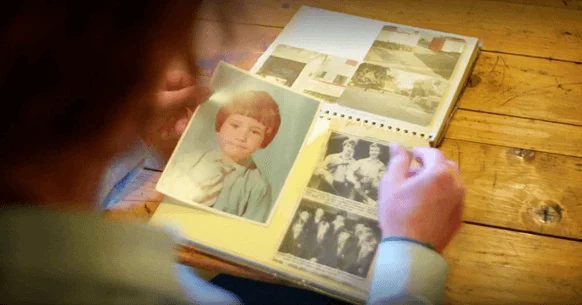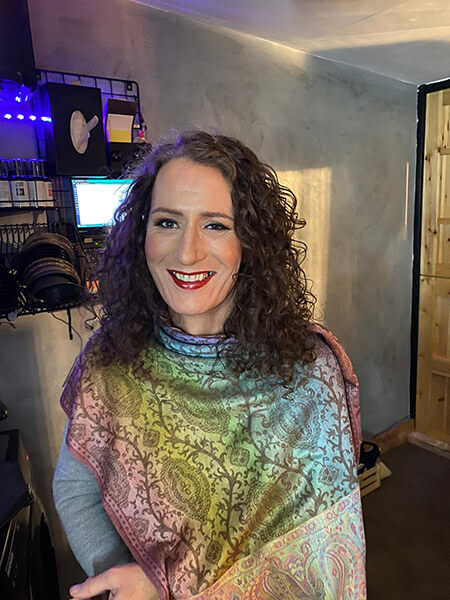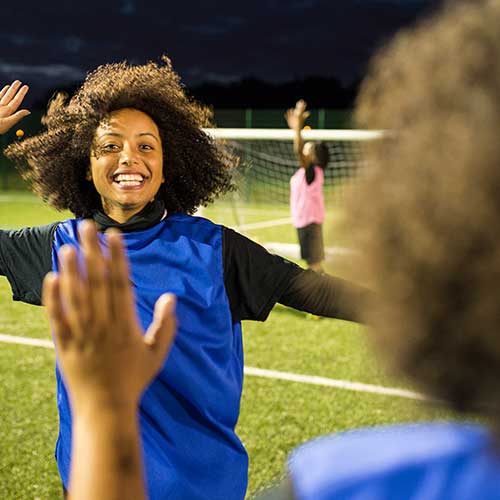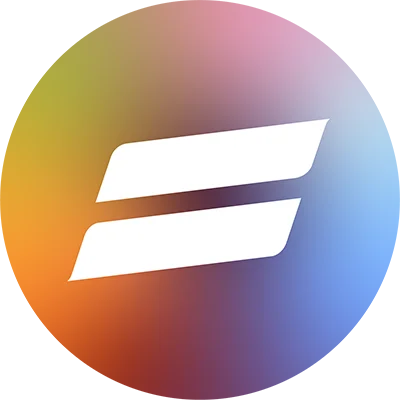31/03/2022
Trans Day of Visibility – A Personal Perspective

Today, on Trans Day of Visibilty, we are honoured that one of our employees has made the decision to share their personal story with our company – helping us continue our commitment to driving the positive change that is needed to foster an environment where everyone feels empowered to be their full authentic selves, both in the workplace and in wider society.
We’re delighted to share Ciara’s story, a Senior Manager at our Reading Innovation Centre.
Some of you may be wondering why I'm so passionate about LGBTQ+ so I think this event today offers a good opportunity to tell you a little bit about myself and my life.
I was born in Belfast in the early 1970s. Those were very troubled times in the history of Ireland, so at some point my dad, who was a surgeon, secured a job in Kuwait, and soon after that our family moved to the Middle East.
I was a happy child, full of energy, innocence and love. I first realized that I was "different" when I was 4 or 5 years old. Growing up, I found that I was usually more interested in wearing dresses and playing with pretty toys. Mum would tell me that I shouldn't be doing things like that.
My dad was ambivalent and usually kept quiet.
I would find some of my Mum’s or sister’s old dresses, put them on and prance around the house. Mum would chastise me, smack me and send me off to my room to change. So, I realised very quickly that I had to hide this from her.
We also had an aya, an Indian Nanny. Her name was Maria, and she was great. She helped me dress up, and this became our little secret. Maria had an apartment around the side of our house, and I used to spend most of my day with her, helping her cook, repair clothes and prepare meals. We had lots of fun. I remember Maria dressing me in sarees, and I would then happily dance around her yard. My sister eventually found out about my "secret", but thankfully she was accepting and supportive.

Occasionally, mum would still catch me playing with a doll, or wearing girls' clothes, and then she would smack and hit me. Over the years, this got worse, and as a kid I never really understood what I was doing wrong. What was she so angry about?
Gradually, I developed a stutter.
When the Gulf War escalated, we had to leave Kuwait. We emigrated to the UK when I was 11. I went to school here, and life seemed fairly "normal". Only it wasn’t, was it? I continued secretly dressing up in female clothes. My relationship with my mum turned into a game of cat & mouse. I was always trying to find better places to hide my makeup and clothes – in old suitcases, under floorboards, and even behind fireplaces – so she wouldn't find and destroy them, but she usually did.
Mum strictly forbid my "dressing up" and she said I was not allowed to ever talk about it to anybody. We argued a lot. My stutter got worse, and eventually I was sent to an elocution specialist. This helped a bit with the stutter, but sadly, I also ended up losing my Irish accent.
At some point, a family friend suggested that I try acting; maybe this could help with my stutter and also give me more confidence. Thankfully it did help, and it was also through acting that I found out I had Dyslexia!
Throughout my childhood and teenage years, my family always encouraged me to get involved in sports that are generally considered very ‚manly’: so I played rugby and field hockey, got into athletics and running. On the plus side, all that exercise helped me keep my body in pretty good shape and made it relatively easy for me to pass as a girl.
When I left home at 18, I tried my best to fit in and be "normal", but my attraction to all things feminine never ceased. Mum told me that if I ever "came out", I would be disowned and excluded from the family. But despite all my efforts to stop, every so often disposing of all my supplies, my desire to dress in female clothes just never went away. I was torn, and at the time the only solution I could see was to keep it secret from my family.
Over the years, I've had to endure counselling, therapy, and medical examinations. I was even given conversion therapy. Ultimately, I was diagnosed with Gender Dysphoria.
I continued dressing up, going out and living life. However, I was often reminded that I didn't conform to the expectations of mainsteam society. I’ve been refused service in a jewellers, asked to leave the female section of a fashion shop, amongst other microaggressions.
Whenever I went out to regular bars, I would get negative comments when using the toilets; I would get misgendered; mocked by staff; questioned about my genitals; and verbally and physically abused. So to avoid all this, I would choose places I knew were ok with misfits like me: Gay bars or clubs, and raves. There I felt accepted – life was good. I can still recall a situation when I was at a rave, in a field, wearing a beautiful dress, dancing like no one was watching! It felt great, and the friends I was with were very accepting and supportive.
Due to the nature of my work, I moved around quite a bit. I lived in the UK, Ireland, Denmark, Sweden, Finland. This made it difficult to find trans-friendly places to go to. In Denmark though, where I spent the most time, I felt accepted and equal. I was able to express my gender identity openly, which was quite a contrast to life in the UK!
In the early 2000s, I seriously thought about "coming out", so I had laser hair removal. I was still quite young and found it fairly easy to pass as a female. The problem was just that society wasn't quite ready for it yet. Brave as I felt, I wasn't quite brave enough.
I did of course meet various partners over the years, and I had several long-term relationships. In those days, people in general knew very little about what it means to be transgender, and unfortunately that also applied to my partners.
I always worried about being “found out”, and when I thought friends were starting to get too close, I would try to preserve a distance and push them away from me. I would then make new friends, but it was tough each time. I was so conditioned to hide the real me, it was ultimately a matter of self-preservation.

In the last 5 years, I've been presenting more as female outside of work. I just wasn't sure I’d be accepted at work. I've also started to transition medically, and I have had many courses of facial electrolysis – you could call it injecting fire! My trans male friends advised me on how to bind my top half, with bandages and compression tops, so people wouldn't notice the changes. My LGBTQ+ friends are like a family to me and have always been very supportive and understanding.
When my mum died a few years ago, I finally decided to "come out" and live the life I really want. When I met my current partner, I was at a really low point. I realised I had 2 choices: it was either come out, or give up and disappear from the face of the earth! Luckily my partner is incredibly supportive.
Today I’m glad I made the decision to come out. I had three brothers. One of them died from Covid last year. My two remaining brothers said to me recently that given they have already lost one sibling, they don't really want to lose another, and so they are gradually getting used to the new me.
Some of my colleagues and friends have already noticed some physical changes in me. I do feel much happier now, and I'm relieved that I can finally tell people my "secret". I have legally changed my name to Ciara Róisín. I now want to make the change complete and be myself at work too. The next time you see me, in about a week, I will be Ciara.
I know it will take some time for people to adjust, but if it’s any consolation for you: it will probably take a bit of time for me too. I do know that we all make mistakes, but with a bit of patience, together, we can make this work. All I’m asking is that you accept me for who I really am.
I'm happy to answer any questions, but do please ask yourself this first: would I ask a cisgender colleague the same question? Could the answer to my question easily be looked up online?
I’m now out and visible. I decided to do this in a very public way because I ultimately want other trans and non-binary people to feel confident enough to come out and become visible too.
I want to finish with a quote from Criss Jami:
"to share your weakness, is to make yourself vulnerable;
to make yourself vulnerable, is to share your strengths"


